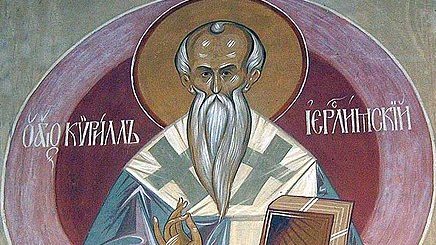Much of what we know about the life of St. Cyril has been compiled from the writings of his younger contemporaries, including Epiphanius, Jerome, and Rufinus, as well as fifth-century historians Socrates, Solomon, and Theodoret.
Cyril was likely born around the year 315 in Jerusalem, when Christianity had just been legalized in the Roman Empire. Although this legalization ended public persecutions that had previously threatened the Church, it indirectly contributed to a number of internal controversies about theology and the jurisdiction of bishops, both of which Cyril became involved in.
Cyril received a thorough education in classical Greek literature and the Bible. He was ordained by Bishop Maximus of Jerusalem, and later succeeded him as bishop in 348. Around the year 350, he delivered a series of lectures to new initiates of the Catholic Church, which are still studied today.
The following year, a large cross-shaped light appeared in the sky over the city, and many people interpreted this as a sign that the Church had triumphed over heresy. It could also been seen as a sign of suffering that the new bishop would undergo.
Unlike many other bishops of the time, Cyril did not let his classical education lead him away from Church teachings, and continued to teach that Christ was fully man and fully divine. However, Archbishop Acacius — who consecrated Cyril as a bishop — allied with the Arian heresy. His false beliefs led many bishops to believe Cyril was involved in the heresy as well.
Through this and other disputes with Acacius, Cyril was exiled from Jerusalem three times over the course of 20 years. He went first to Taraus, and took refuge with Bishop Silvanus. In 359, he came to the Council of Seleucia, where Acaius was deposed and Cyril was returned to his see. But a year later, he was driven out again, and only returned when the emperor had been replaced in 361.
Six years later, the new emperor banished all bishops who had been restored under Julian, and Cyril remained in exile for the next 11 years.
In 381, Cyril participated in the Second Ecumenical Council, which condemned Arianism and added references to the Holy Spirit to the Nicene Creed in 325.
St. Cyril died in 387, and was named a Doctor of the Church in 1883.

